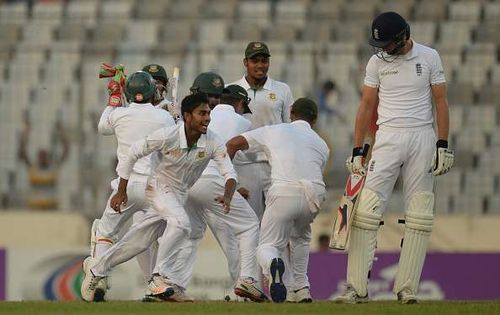
Bangladesh have finally arrived and it's an arrival that cricket should celebrate

As the curtains came down on England's short tour to Bangladesh, with Bangladesh players celebrating a truly historic win, there was a feeling among the viewers that they had witnessed a watershed moment in Test cricket. It seemed that the long and arduous task that Bangladesh Cricket had undertaken on November 10, 2000 at Bangabandhu National Stadium, Dhaka had finally borne fruit and Bangladesh had finally arrived on the global cricketing scene.
The dynamics of International cricket are so unique to the sport, that it’s hard to find any sporting parallel to describe or give context to what Bangladesh achieved. The global cricket community is a large one, and ICC has done well to try and spread the game to the various parts of the world.
Also read: 5 biggest wins in Bangladesh's cricket history
However, even so, the true cricketing nations can be counted on our fingertips. Even among the true cricketing nations, there exists a niche group of countries, who form the heavyweights of the game, and International cricket essentially revolves around these select few countries.
Bangladesh finally break the barrier
The ultimate target of cricket expansion has always been to expand this niche group and eventually take a (dare I say) minor cricketing nation, and with proper nurturing, develop it into a cricketing powerhouse. Not only must the team be strong and able to compete, but cricket should also capture the imagination of the people in that nation who become invested in its team's successes and failures.
It was a target that had never truly seemed achievable, and for the longest while, it had seemed that the transition from a minor cricketing nation to eventually becoming a global cricket powerhouse, was a step too far.
However, with their historic test win, Bangladesh have broken through that barrier and have shown the model and path to be applied to other cricketing nations. It was by no means the first Test that Bangladesh had won. In the past Bangladesh have beaten Zimbabwe and in 2009 even won a 2 Test match series in West Indies, 2-0!!
However, given the various dynamics involved, wins over Zimbabwe and WI, didn't impress anyone. For a long while Bangladesh, Zimbabwe, and Windies formed a sub-group of weaker Test nations. A sub-group that was unlikely to beat any team outside of this sub-group, and within this sub-group, one of the teams beating either of the other two was hardly considered groundbreaking.
However, in beating England, Bangladesh finally shattered the glass ceiling. They didn't just beat a weak Zimbabwe side or a WI side which struggles to play the longest version of the game. Bangladesh felled a giant of the game, they beat one of the 'Big Three.' Now that is something to sit up and take notice of and applaud.
Early signs

Bangladesh had taken giant strides in their development following a disappointing 2014 World Cup campaign. In quick succession, they beat Pakistan, India and South Africa in limited overs series. While these wins were all at home, a team still has to start winning somewhere, and above all they were wins!
In the recent T20 Asia Cup, Bangladesh reached the final, ahead of Sri Lanka and Pakistan, two traditional cricketing powerhouses. These wins showed that Bangladesh cricket was changing for the better, but the real test was always going to be Test cricket.
The wait was long, and there were numerous matches after which Bangladesh's Test status was called into question. Test cricket is the toughest format of the game, and consequently, it is in this format where the gap between the strong teams and the weak ones is the widest. That large gap was bridged today at the Shere-e-Bangla stadium, Mirpur.
Bangladesh's long journey showed that the path to cricketing success for a minor cricket nation is slow and needs patience. There is no point in asking Test status to be revoked after every disappointment, and the development is often slow, and sometimes barely visible. These are the lessons that the cricketing community will need to apply to the next nation which undertakes this journey.
Also read: 5 Talking Points from Bangladesh's historic victory against England in the 2nd Test
Going forward, it is also important to apply this lesson of patience to Bangladesh itself. It would be too much to expect Bangladesh to start replicating these wins in away Tests as well, especially overseas. It’s a fair assessment that Bangladesh won't be winning a Test in England soon, but then again, it’s also unlikely that England will be winning a series in Bangladesh without a tough fight.
Now picture Australia, who have won just 1 Test in Asia in nearly a decade, touring Bangladesh and playing on those wickets, or South Africa who got easily and convincingly beaten in India on similar tracks, and suddenly the International Test itinerary seems rife with close contests that hitherto didn't seem possible.
Exciting new chapter for world cricket

However, perhaps the biggest reason why Bangladesh's win over England feels like such a groundbreaking one, is because of the possibilities that exist beyond the cricket field. There is little point in being good in an International sport if the viewers back home don't care. With Bangladesh, it’s exactly the opposite.
The people are deeply invested in the fortunes of the national cricket team, and back the team, regardless of whether they are winning or not. Cricketers are national heroes in Bangladesh, and it would be hardly an overstatement to say that Bangladesh is a huge cricketing market with plenty of untapped potential.
So far the fact that the Bangladesh team was not really strong enough to compete with the best, had held back this market. Why do you think there has never been an English or an Australian summer headlined by a Test series against Bangladesh. Whether fans like it or not, money does dictate these things. With Bangladesh's new found success, all kinds of doors have now potentially opened up.
Bangladesh's win over England really does feel like the start of an exciting new chapter in the world of cricket.